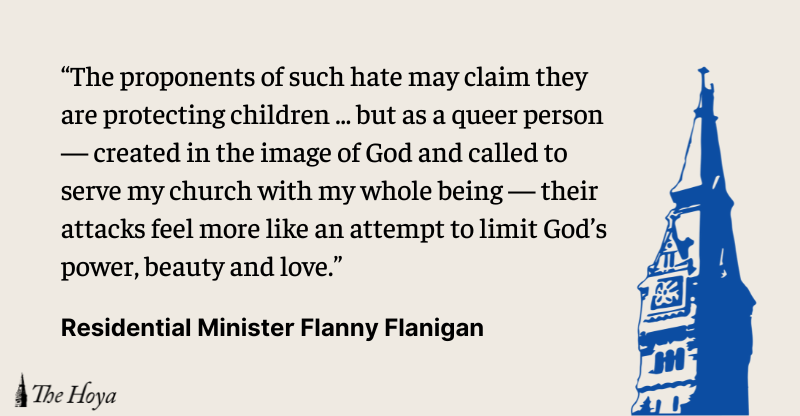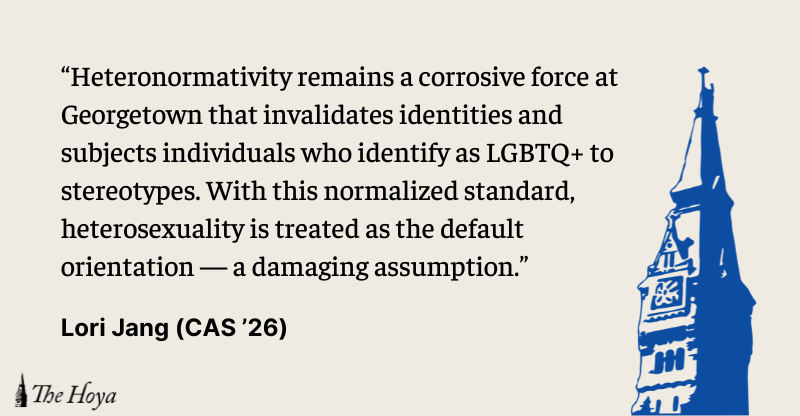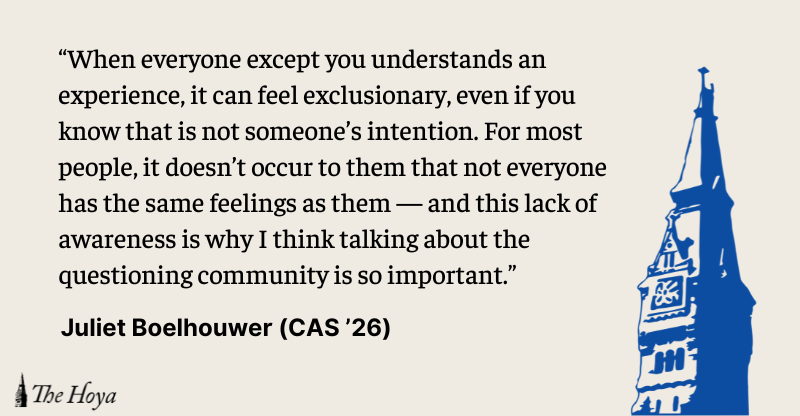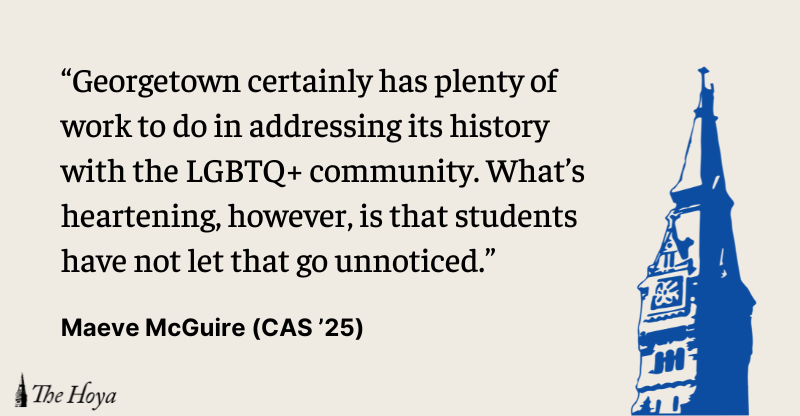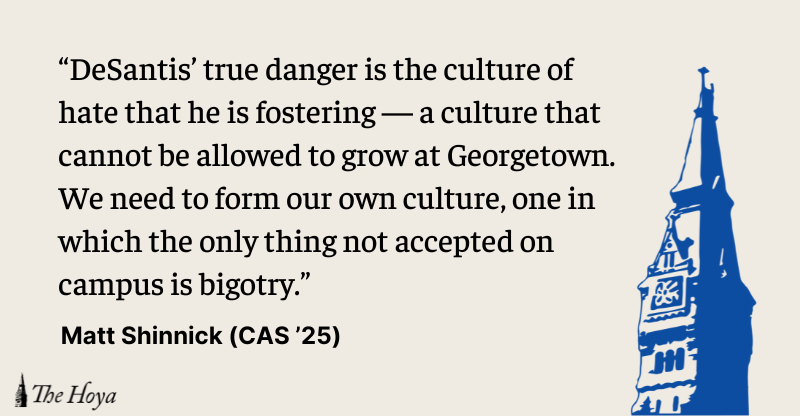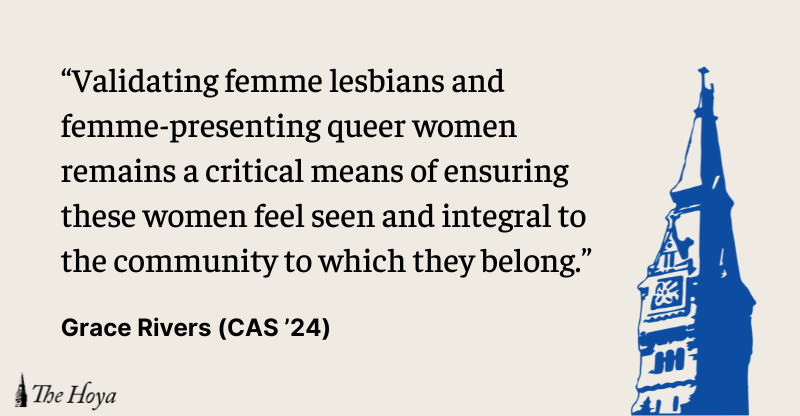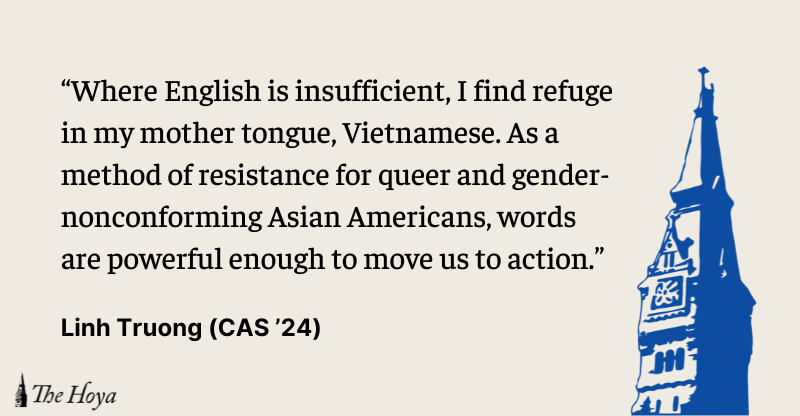I firmly and deeply believe that God is trans. Or queer, or gender-nonconforming in some manner or another. I know and trust this understanding for a variety of reasons, mainly because the divine — whatever people may call it or define it — feels too vast, too mysterious, too undefinable to fit neatly into any earthly binary or gender descriptor.
But also because, as a gender-nonconforming, queer, gay person myself, I crave images of the divine that I can relate to, that look like me, that affirm and celebrate my existence. I understand the divine as referring to the God who created me, who nurtures me and who supports me.
I recognize that, to many, Georgetown University’s commitment to both its religious heritage and LGBTQ+ acceptance may seem contradictory, but I have found that this viewpoint undermines the wisdom that lies at the intersection between faith, gender and sexuality.
Indeed, this community is strongest when it embraces the opportunity to explore the sacrality of queerness and the queerness of faith. This is the blessing and opportunity of belonging to a community that possesses such a strong commitment to faith and justice.
As a gender-nonconforming individual who grew up in a fairly conservative Christian tradition in Tennessee, I often receive some variation of the question: “Why do you stick with the church?”
I know why I hear the question so often — the church does not exactly have the best history with LGBTQ+ people.
Indeed, I have been hurt by, excluded from and made to feel less than by the church and by religious leaders. I know and feel the pain that has been caused by those who act unjustly while claiming divine authority.
And I have also been loved, affirmed, celebrated and empowered by religious communities. I now belong to the Presbyterian denomination, a tradition that descends from the theology of John Calvin and the Church of Scotland. A phrase that I hear mentioned often within this tradition is that we are “reformed and reforming.” This phrase recognizes both the church’s connections to the Protestant Reformation and also to that fact there is still room for growth and change. I rely on my faith and the communities it connects me to, because I can’t help but understand the church itself as a queer body.
And so it pains me to see the rampant rise of transphobia across the United States, particularly by people who root their hatred in Christian understandings of gender. Whether it be laws intended to limit access to gender-affirming health care for minors, criminalize drag performances or oppose instruction about LGBTQ+ topics in school, the recent wave of anti-trans legislation presents an ungodly assault on LGBTQ+ identities.
Beyond the obvious harm these views, policies and actions pose to LGBTQ+ persons, they also represent such a limited understanding of the divine and of the communities we may create together.
I know this rhetoric is far from exclusive to Christian communities — and likewise that many Christian communities are very vocal in their support of trans bodies — but I still can’t help but lament the space and encouragement that so many religious communities have given to voices that seek to denigrate others based on their gender and sexuality.
I weep for anyone who asserts that God only creates people in one of two genders with no wiggle room or fluidity. I believe, understand and trust that everyone — gay and straight, cis and trans, binary and nonbinary — is stronger when their community embraces more opportunities to identify, express themselves and love beyond any boundaries.
I believe this because that is the space the church occupies in my life — a space unlike any school or workplace to which I have belonged.
I don’t need to look far within the Christian tradition or its history to find examples of nonnormative expressions of gender and sexuality. Our holy text contains many examples of people forming families and supporting each other in ways that feel queer in one way or another, whether it be how Ruth clings to her mother-in-law and vows to continue together as a family even after the men in their lives have died, or Jesus’ repeated calls to his followers to leave their families and married partners to be in community with each other. And don’t get me started on Jesus’ situation — conceived under unique circumstances and raised with two dads and a mom.
I don’t mention these examples to essentialize or gatekeep queer experiences or identities, but rather to recognize that the sacred text says a lot more about gender and sexuality than just preaching marrying someone of the opposite sex and having kids.
And so I cannot accept transphobic rhetoric or anti-LGBTQ+ policies, not just because they are an attack on queer bodies, but also because they place a limit on spiritual and religious expression.
The proponents of such hate may claim they are protecting children, empowering parental rights or ensuring some divine order, but as a queer person — created in the image of God and called to serve my church with my whole being — their attacks feel more like an attempt to limit God’s power, beauty and love.
However you may seek the divine, whatever names you use to call God and whatever identities you may ascribe to your holy being, let your expression of self be a divine revolution against those who seek to belittle, shame or marginalize you.
Flanny Flanigan is a Residential Minister at Georgetown University.


